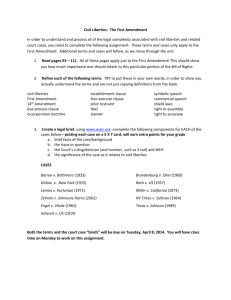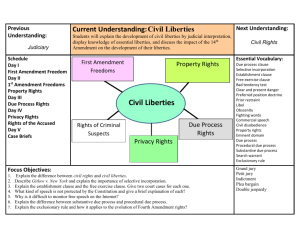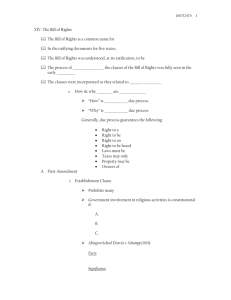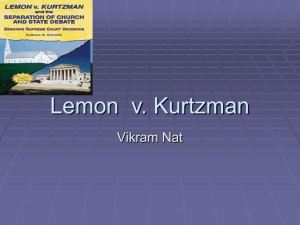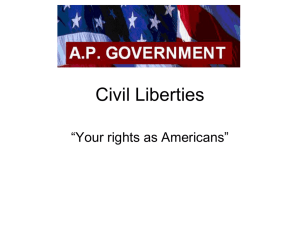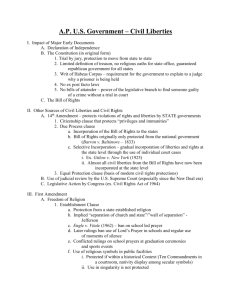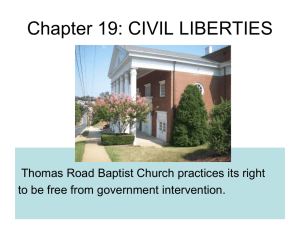Chapter 4
advertisement
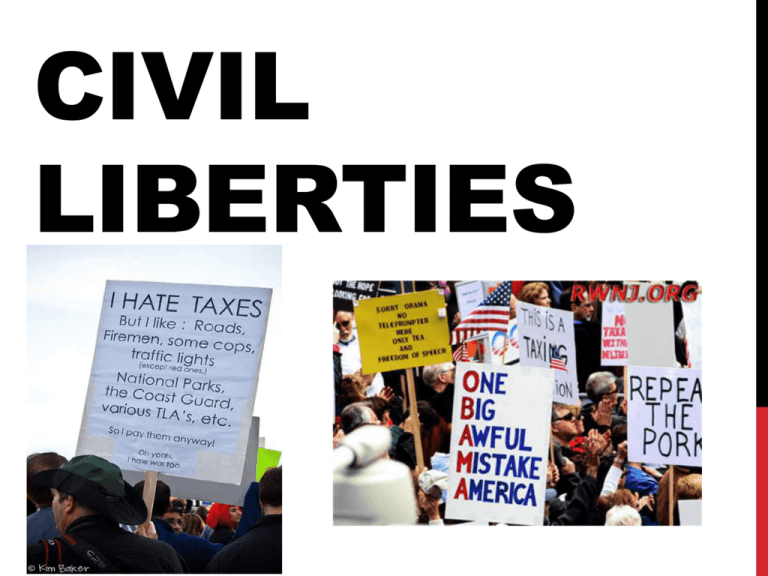
CIVIL LIBERTIES THE POLITICS OF CIVIL LIBERTIES Civil liberties: protections the Constitution provides individuals against the abuse of government power State ratifying constitutions demanded the addition of the Bill of Rights THE FOURTEENTH AMENDMENT (1868) Due Process Clause: “no state shall deprive any person of life, liberty or property without due process of law.” This clause is the basis of civil liberties cases. Equal Protection Clause: “no state shall deny to any person within its jurisdiction the equal protection of the laws.” This clause is the basis of civil rights cases. INCORPORATION 1925 (Gitlow v. New York): declared federal guarantees of free speech and free press also applied to states. Fundamental rights in the Bill of Rights apply to actions by the states. This case began the process of “selective incorporation.” BILL OF RIGHTS THE FIRST AMENDMENT The First Amendment protects freedom of speech, press, assembly, religion and petition. Freedom of religion is protected in two clauses • The Free Exercise Clause • The Establishment Clause FREEDOM OF EXPRESSION Prior Restraint: As a general rule, the Court does not permit restraint of material prior to publication (Pentagon Papers case). There are limitations on freedom of expression, including speech that presents “a clear and present danger,” defamation and obscenity. FREE PRESS AND FAIR TRIALS Generally speaking courts side with the press and the publics “right to know” Defense attorneys accuse press of covering a case in so much depth that an impartial jury cannot be found Reporters do not have to reveal sources; some states have shield laws If there are no shield laws, right to a fair trail trumps protection of source But, the court has never upheld a restriction on the press in name of fair trail. Best thing to do in high powered case is to sequester jury DEFAMATION Libel: a written false statement defaming another Slander: a defamatory oral statement Public figures must also show the words were written with “actual malice”—with reckless disregard for the truth or with knowledge that the words were false. OBSCENITY Miller v. California (1973): judged by “the average person, applying contemporary community standards” to appeal to the “prurient interest” or to depict “in a patently offensive way, sexual conduct specifically defined by applicable state law” and lacking “serious literary, artistic, political, or scientific value” SYMBOLIC SPEECH Some speech can be made illegal, even though it conveys a political message (example: burning a draft card). However, statutes cannot make certain types of symbolic speech illegal. For example, flag burning is protected speech. COMMERCIAL SPEECH Commercial speech, such as advertising, can be restricted; the FTC prohibits false claims. FCC regulates content, nature, and existence of TV and radio- provide licenses for stations to operate In FCC v. Pacifica (1978) the Court upheld restrictions on foul language over the public airways. FREEDOM OF ASSEMBLY • Right to assemble • “Peacefully Assemble” in order to make a statement • Can place reasonable limits on this right: time, place, and manner • Usually need to apply for a permit to hold protest • May need to worry about balancing this right with public order and safety (abortion clinic protests) • Right to associate • Right to hang out with others who share similar beliefs THE FREE EXERCISE CLAUSE Insures that no law may impose particular burdens on religious institutions. Prohibits abridgement of the freedom to worship (or not to worship). Some conflicts between religious freedom and public policy are difficult to settle. THE ESTABLISHMENT CLAUSE Government involvement in religious activities is constitutional if it meets the following test (Lemon v. Kurtzman, 1971): • Secular purpose • Primary effect neither advances nor inhibits religion • No excessive government entanglement with religion RIGHTS OF DEFENDANTS The Fourth Amendment protects against unreasonable searches and seizures and requires search warrants. The Fifth Amendment protects against selfincrimination. The Sixth Amendment says the accused has a right to counsel, speedy trial, impartial jury, hear witnesses against them. The Eighth Amendment prohibits excessive bail and fines and cruel and unusual punishment. EXCLUSIONARY RULE Exclusionary rule (Mapp v. Ohio, 1961): evidence gathered in violation of the Constitution cannot be used in a trial. The exclusionary rule stems from the Fourth Amendment (freedom from unreasonable searches and seizures) and the Fifth Amendment (protection against self incrimination). SEARCH AND SEIZURE A properly obtained search warrant is an order from a judge authorizing the search of a place and describing what is to be searched and seized. A judge can issue only if there is probable cause What can the police search, incident to a lawful arrest? • The individual being arrested • Things in plain view • Things or places under the immediate control of the individual CONFESSIONS AND SELF INCRIMINATION Miranda case: confessions are presumed to be involuntary and cannot be used in court unless the suspect is fully informed of his or her rights Miranda rights apply once a suspect is in custody. THE RIGHT TO COUNSEL The Sixth Amendment provides the accused with a right to have the assistance of counsel for his defense. Gideon v. Wainright (1963) says that the state must provide an attorney in felony cases if the accused cannot afford one. This was an unfunded mandate. THE DEATH PENALTY Furman v. Georgia (1972): the death penalty, was applied in a freakish and random fashion and was, in this particular case, unconstitutional. States rewrote their death penalty statutes to include aggravating and mitigating factors Gregg v. Georgia (1976): the death penalty is an expression of society’s outrage. THE RIGHT TO PRIVACY Not explicitly stated in the Constitution yet we do have a right to privacy Griswold v. Connecticut (1965): Bill of Rights casts penumbras (unstated liberties implied through explicit rights) that include right to privacy Biggest controversy in right to privacy cases is over the issue of abortion

